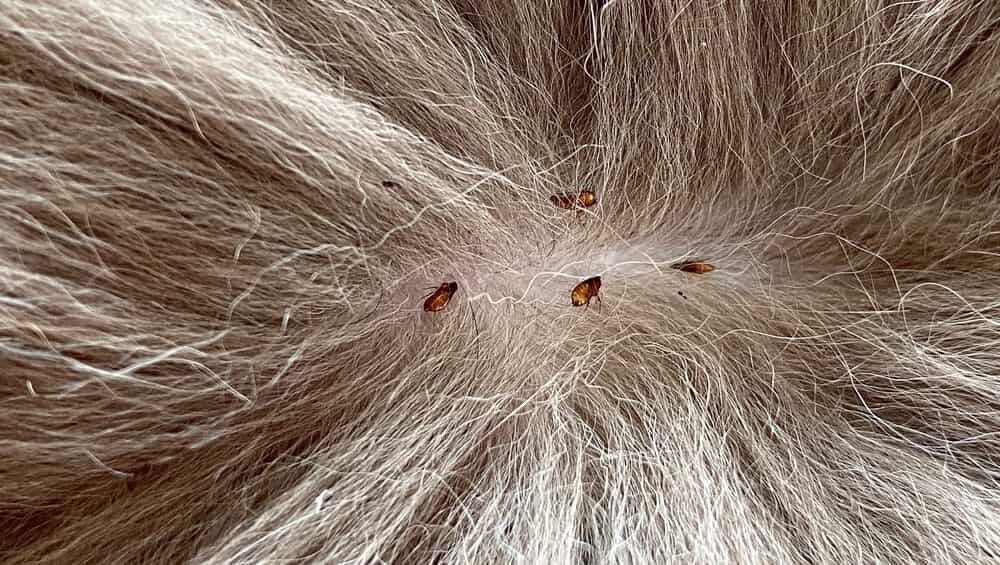Fleas in dogs: veterinarians urged to act quickly, otherwise they will live in your home

Fleas are small parasites that feed on the blood of animals. These parasites are quite common and can live in the fur of not only stray animals, but also your well-groomed pet dog.
Fleas are quite small and have a flat, oval brown body. They can jump long distances, which helps them move quickly from one host to another. If a dog with fleas lives indoors, these parasites can live in dog bedding, carpets, and even upholstered furniture.
See also: There is no better remedy: how to remove fleas from your home and apartment
Fleas can be transmitted from animal to animal directly or through the environment. They can also bite humans, but usually do not cause any serious health problems other than allergic reactions to the bite.
Symptoms of a flea infestation in dogs include:
- Itching
- Loss of hair
- Dermatitis
- Anemia
Fleas can also carry diseases such as distemper, hepatitis, and bartonellosis.
If you suspect that your dog has fleas, it is important to contact your veterinarian for diagnosis and treatment. Treatment usually involves the use of insecticidal medications that kill fleas and their eggs. However, it is also important to carry out preventive treatment of the room where the dog slept, walked, or just lay down.
Experts from Animalreport advise checking dogs' fur for fleas from time to time. If you don't pay attention in time, these parasites can cause your dog discomfort and itching, or even lead to more serious health problems.
How to tell if your dog has fleas
If your dog is constantly itching and biting his skin, check the places on his body where fleas like to hide - the base of the tail, behind the ears, and around the neck.
Fleas leave their feces among the fur, which look like black specks. If you put them on a damp paper towel, they will dissolve into red or brown spots.
A dog's loss of hair can also indicate fleas. Veterinarians have noted that choosing the right flea treatment for your dog is important for his comfort and well-being. There are different options, each with their own advantages and disadvantages. Talk to your veterinarian to determine the most appropriate treatment for your dog, taking into account factors such as age, size, and health.

How long do fleas live
Understanding the life cycle of these parasites is essential to effective flea control. So, the flea life cycle consists of four stages:
First, adult female fleas lay their eggs on your dog's fur, which may then fall onto the carpet or sofa on which your dog is lying. These eggs hatch into larvae within a few days to two weeks, depending on the temperature and humidity.
In the second stage, flea larvae are tiny worm-like creatures that feed on flea dirt and other organic debris. They avoid light and burrow deep into carpets, bedding, or even soil. After 5-20 days, they spin a cocoon and enter the pupal stage.
During the pupal stage, the flea larvae develop into adults inside the cocoon. This stage can last from a few days to several months, depending on environmental conditions. Fleas can emerge from their cocoons when they sense a potential host nearby.
Finally, adult fleas begin to feed on the blood of their victims. As soon as they find a host, they begin to feed, mate and lay eggs, completing their life cycle.
Therefore, experts say, effective flea control requires treating both your dog and the environment in which he is in order to break the cycle and prevent re-infestation.
How long can fleas live on a dog
Adult fleas can live on a dog for approximately 2-3 weeks, during which time they feed, mate, and lay eggs. However, their lifespan can be shorter if they are not removed in time.
How to keep your home flea-free
Treat your dog regularly with veterinarian-approved flea prevention products, such as topical treatments or oral medications. Follow your veterinarian's recommendations closely to ensure that your dog is not harmed.
Clean your home - vacuum carpets, upholstery, and pet bedding frequently to remove flea eggs, larvae, and pupae. Remember to empty the vacuum after each use to prevent fleas from escaping back into your home.
Wash bedding, toys, and any items your dog has come in contact with at least once a week in hot water. This will help kill any fleas or their eggs.
Take care of your yard - fleas like to hide in shady, damp areas with organic debris. Mow your lawn, trim bushes, rake leaves and other organic materials to minimize the environment conducive to fleas.
To help get rid of these parasites, UAportal has shared tips to help get fleas out of the house.
If you want to get the latest news about the war and events in Ukraine, subscribe to our Telegram channel!
